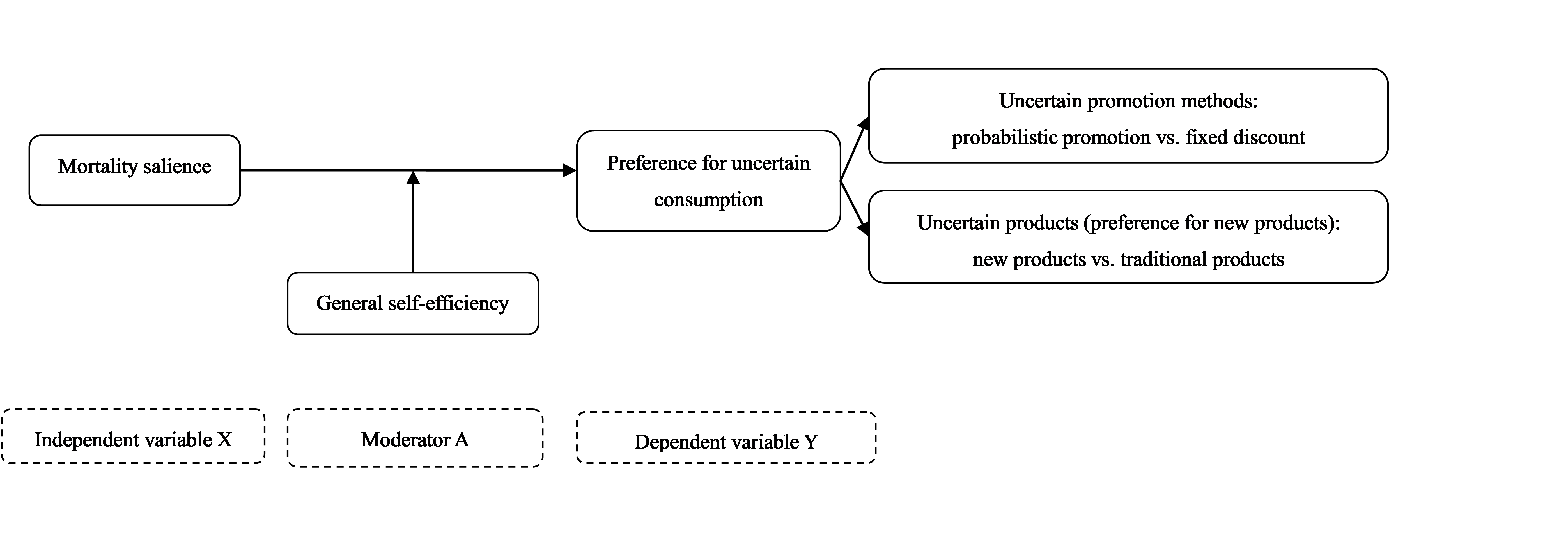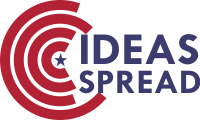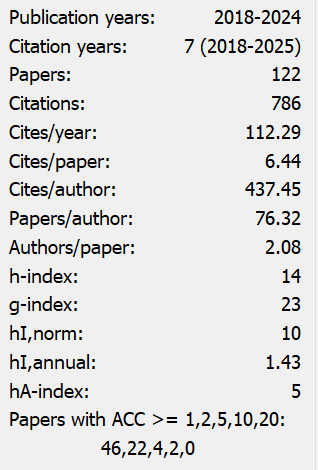Uncertain Consumption Preference under Mortality Salience
Abstract
Based on the relevant theoretical research on mortality salience and general self-efficacy, this paper tests the impact of mortality salience on uncertain consumption intention through experiments. It is found that mortality salience increases consumers’ preference to choose uncertain probabilistic promotion methods, but decreases individuals’ evaluation of new products. During the process above, the moderating effect of general self-efficacy was tested. Based on the results, this study provides specific suggestions on the marketing and product strategies in the context of mortality salience.
References
Chelsea, G., Gregory, S. C., & Hayagreeva, R. (2020). Disgusted and Afraid: Consumer Choices under the Threat of Contagious Disease. Journal of Consumer Research, 47(3), 373-392. https://doi.org/10.1093/jcr/ucaa025
Chen, R., & Zheng, Y. (2015). The impact of loneliness on uncertain consumption preference: New products, product packaging and the performance in probabilistic promotion. Acta Psychologica Sinica, 47(8). https://doi.org/10.3724/SP.J.1041.2015.01067
Chen, Y. (2021). The impact of perceived threat on consumers’ sustainable consumption intention, master’s thesis of Beijing Foreign Studies University. https://doi.org/10.26962/d.cnki.gbjwu.2021.000096
Duan, M. (2014). Review of research on death anxiety and consumption behavior based on Terrorism Management Theory. Foreign Economics & Management, 36(3). https://doi.org/10.16538/j.cnki.fem.2014.03.002
Ferraro, R., Shiv, B., & Bettman, J. R. (2005). Let us eat and drink, for tomorrow we shall die: Effects of mortality salience and self-esteem on self-regulation in consumer choice. Journal Of Consumer Research, 32(1), 65-75. https://doi.org/10.1086/429601
Friese, M., & Hofmann, W. (2008). What would you have as a last supper? Thoughts about death influence evaluation and con sumption of food products. Journal of Experimental Social Psychology, 44(5), 1388-1394. https://doi.org/10.1016/j.jesp.2008.06.003
Gao, S. (2000). Review of self-efficacy theory, Psychological Development and Education, Issue 1. https://doi.org/10.16187/j.cnki.issn1001-4918.2000.01.011
Gentry, J. W., Baker, S. M., & Kraft, F. B. (1995). The role of possessions in creating, maintaining and preserving one’s identity: Variation over the life course[A]. Kardes F and Sujan M(Eds. ). Advances in consumer research[C]. Provo, UT: Association for Consumer Research, 22, 413-418.
Giannelloni, J. L. (1998). Les comportements liés à la protection de l’ environnement et leurs déterminants: Un état des recherches en marketing. Recherche et Applications en Marketing, 13(2), 49-72. https://doi.org/10.1177/076737019801300204
Goldsmith, K., & Amir, O. (1010). Can uncertainty improve promotions? Journal of Marketing Research, 47, 1070-1077. https://doi.org/10.1509/jmkr.47.6.1070.
Greenberg, J., Pyszczynski, T., Solomon, S., Simon, L., & Breus, M. (1994). Role of consciousness and accessibility of death-related thoughts in mortality salience effects. Journal Of Personality And Social Psychology, 67(4), 627-637. https://doi.org/10.1037/0022-3514.67.4.627
Herzenstein, M., Posavac, S. S., & Brakus, J. J. (2007). Adoption of new and really new products: The effects of self-regulation systems and risk salience. Journal of Marketing, 44(2), 251-260. https://doi.org/10.1509/jmkr.44.2.251
Jonas, E., Jeff, S., Jeff, G., & Tom, P. (2002). The Scrooge Effect: Evidence That Mortality Salience Increases Prosocial Attitudes and Behavior. Personality and Social Psychology Bulletin, 28(10), 1342-1353. https://doi.org/10.1177/014616702236834
Kasser, T., & Sheldon, K. M. (2000). Of wealth and death: Materialism, mortality salience and consumption behavior. Psychological Science, 11(4), 348-351. https://doi.org/10.1111/1467-9280.00269
Ke, X. (2009). Catastrophes can reduce consumers’ diversification seeking behavior: A study based on Terror Management Theory, Management World, Issue 11. https://doi.org/10.19744/j.cnki.11-1235/f.2009.11.014
Ke, X., & Lin, S. (2011). Will disaster reporting affect public consumption decisions?: Reflections based on Terror Management Theory. Business Management Journal, 33(4). https://doi.org/10.19616/j.cnki.bmj.2011.04.026
Kopp, S. W., & Pullen, B. K. (2002). Death attitudes and consumer behavior: Purchasing “end of life” goods, American Marketing Association Winter Educators’ Conference, Austin, Texas.
Laran, J., & Tsiros, M. (2013). An investigation of the effectiveness of uncertainty in marketing promotions involving free gifts. Journal of Marketing, 77, 112-123, https://doi.org/10.1509/jm.11.0255
Lea, D., Katherine, W., & Darren, W. D. (2020). A Little Piece of Me: When Mortality Reminders Lead to Giving to Others. Journal of Consumer Research, 47(3), 431-453. https://doi.org/10.1093/jcr/ucaa020
Liu, W., Wang, H., & He, L. (2014). Consumption of domestic goods at the end of human life? Analysis of the phenomenon, mediation and boundary condition of the exposure of death information increasing choice of domestic goods. Acta Psychologica Sinica, 46(11). https://doi.org/10.3724/SP.J.1041.2014.01748
Liu, X., Li, F., & Wang, S. (2017). Research on the influence mechanism of self-efficacy and persuasion resistance on consumers’ willingness to accept socialized business models. Management Review, 29(6). https://doi.org/10.14120/j.cnki.cn11-5057/f.2017.06.029
Lu, K., Shen, K., & Li, H. (2017). The role of emotion in Terror Management Theory. Advances in Psychological Science, 25(1). https://doi.org/10.3724/SP.J.1042.2017.00076
Lu, K., Wang, X., & Li, H. (2019). The relationship between different defense mechanisms against death anxiety in terror management. Advances in Psychological Science, 27(2). https://doi.org/10.3724/SP.J.1042.2019.00344
Mandel, N., & Heine, S. J. (1999). Terror management and marketing: He who dies with the most toys wins, Arnould E. J. & Scott L. M. (Eds.). Advances in consumer research[C]. Provo, UT: Association for Consumer Research, 26, 527-532.
Niu, W. (2013). Comparison of mortality salience materials, master’s thesis of Shanghai Normal University. https://doi.org/10.7666/d.Y2284327
Pyszczynski, T., Greenberg, J., & Solomon, S. (1997). Why do we need what we need? A terror management perspective on roots of human social motivation. Psychological Inquiry, 8(1), 1-20. https://doi.org/10.1207/s15327965pli0801_1
Pyszczynski, T., Greenberg, J., & Solomon, S. (1999). A dual process model of defense against conscious and unconscious death-related thoughts: An extension of terror management theory. Psychological Review, 106, 835-845. https://doi.org/10.1037/0033-295X.106.4.835
Ram, S., & Sheth, J. N. (1989). Consumer Resistance to Innovations: The Marketing problem and its solution. Journal of Consumer Marketing, 6(2), 5-14, https://doi.org/10.1108/EUM0000000002542
Rindfleisch, A., Burroughs, J. E., & Wong, N. (2009). The safety of objects: Materialism, existential insecurity, and brand connection. Journal of Consumer Research, 36(1), 1-16. https://doi.org/10.1086/595718
Schwarzer, R., & Born, A. (1997). Optimistic self-beliefs: Assessment of general perceived self-efficacy in thirteen cultures. World Psychology, 3, 177-190. https://www.researchgate.net/publication/284758239
Sheldon, S., Jeff, G., & Tom, P. (2016). The Worm at the Core: On the Role of Death in Life, translated by Chen Fangfang, China Machine Press.
Su, S., Xiong, S., & Wu, H. (2017). Research on the relationship between college students’ shopping decision-making styles and self-efficacy. Market Modernization, 15, 29-30. https://doi.org/10.14013/j.cnki.scxdh.2017.15.011
Tang, X. (2021). Research on the impact of epidemic threat perception on excessive consumption behavior from the perspective of stress response mechanism, master’s thesis of Beijing Foreign Studies University. https://doi.org/10.26962/d.cnki.gbjwu.2021.001046
Wang, C., Hu, Z., & Liu, Y. (2001). A Study on the reliability and validity of general self-efficacy scales. Chinese Journal of Applied Psychology, 1.
Wen, Z., Hou, J., & Zhang, L. (2005). Comparison and application of moderating effect and mediating effect. Acta Psychologica Sinica, 2, 268-274.
Wisman, A., & Koole, S. L. (2003). Hiding in the crowd: Can mortality salience promote affiliation with others who oppose one’s worldviews? Journal of Personality and Social Psychology, 84(3), 511-526. https://doi.org/10.1037/0022-3514.84.3.511
Wood Stacy (2010). The Comfort Food Fallacy: Avoiding Old Favorites in Times of Change. Journal of Consumer Research, 36(6), 950-963. https://doi.org/10.1086/644749
Yalom, I. D. (2015). Staring at the Sun: Overcoming the Terror of Death, translated by Zhang Ya, China Light Industry Press.
Yan, D. F., & Muthukrishnan, A. V. (2014). Killing hope with good intentions: The effects of consolation prizes on preference for lottery promotions. Journal of Marketing Research, 51, 198-204. https://doi.org/10.1509/jmr.12.0230
Yunhui, H., & Jaideep, S. (2020). The Influence of Disease Cues on Preference for Typical versus Atypical Products. Journal of Consumer Research, 47(3), 393-411. https://doi.org/10.1093/jcr/ucaa029
Zhang, D., Fang, L., & Ling, W. (1999). Theory and research status of self-efficacy. Advances in Psychological Science, 1, 39-43.
Zhou, S. (2018). Research on the dual-path impact mechanism of death information threat on consumers’ commodity choice tendency, doctoral thesis of Jilin University.
Zhou, W., & Guo, G. (2006). Self efficacy: Concept, theory and application. Journal of Renmin University of China, 1, 91-97. CNKI: SUN:ZRDX.0.2006-01-013
Zhu, G., Ma, L., Sangwan, S., & Lv, T. (2010). Consumer adoption models and empirical research based on social cognitive theory. Nankai Business Review, 13(3). https://doi.org/10.3969/j.issn.1008-3448.2010.03.003


This work is licensed under a Creative Commons Attribution 4.0 International License.
Copyright for this article is retained by the author(s), with first publication rights granted to the journal.
This is an open-access article distributed under the terms and conditions of the Creative Commons Attribution license (http://creativecommons.org/licenses/by/4.0/).


























